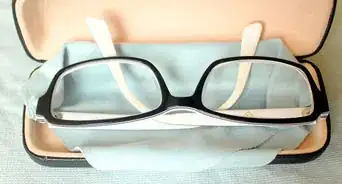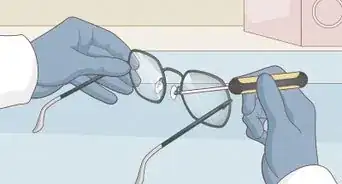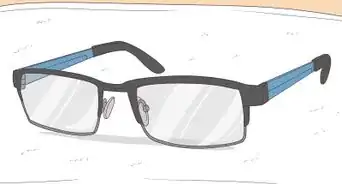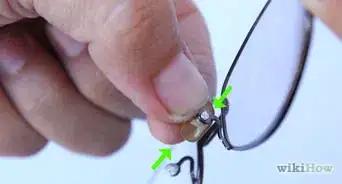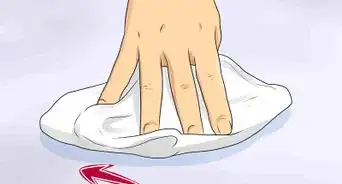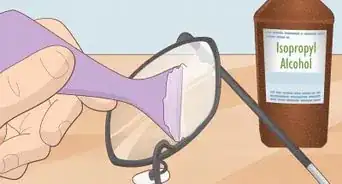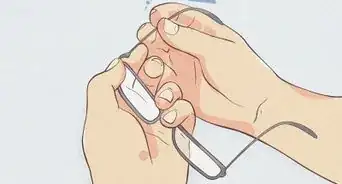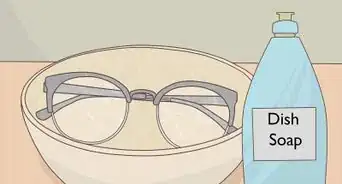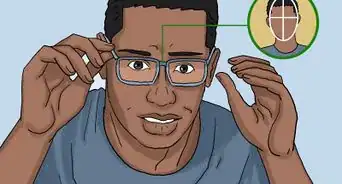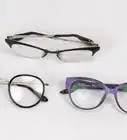X
This article was medically reviewed by Shaune Wallace, OD. Dr. Wallace is an Optometrist in Nevada with over 14 years of optometry experience. He received his OD from the Southern California College of Optometry in 2006 and is a member of the American Optometric Association.
This article has been viewed 40,767 times.
If scratched, eyeglasses can be difficult to see through and cause eye strain and headaches. There are many ways to avoid scratching eyeglasses. Take care when cleaning and removing your glasses. If you're worried about scratches, take certain preventative measures to avoid damage.
Steps
Method 1
Method 1 of 3:
Avoiding Damage
-
1Clean your glasses regularly. If you want to avoid scratches and other damage to your lenses, make sure to clean your glasses on a regular basis. Use the right materials when cleaning your glasses to assure you avoid scratches.
- If you use chemical sprays or lens cleaners, be careful when you spray your lenses. Spray from an appropriate distance, as outlined on the cleaner container, and always use sprays specifically designed to clean lenses. Never use household cleaners like Windex.[1]
- Use the right cloth. Paper towel, tissue, and napkins should not be used to dry lenses. These can cause tears and other damage to the frames. You should also avoid using the corner of your shirt. If you use fabric softener on your clothes it can cause streaks on your lenses. You should only use 100% cotton wipes made explicitly for cleaning lenses.[2]
- Air dry your glasses when you clean them. This prevents materials from getting caught on your lenses, which can lead to tears and other damages.[3]
-
2Take care when removing your glasses. Oftentimes, glasses get scratched when they're dropped. It may be helpful to use two hands when removing glasses so you can remove the frame straight off your face and not bend the sides. Grip your glasses firmly when removing. Remove your glasses slowly. Not only can dropping glasses cause scratches, you could also potentially bend the frames through hasty removal.[4]Advertisement
-
3Use a case. Always use a glasses case. When you're not wearing your glasses, do not simply leave them lying around. Always use a protective case. You can ask your eye doctor for advice on the most durable type of glasses case.[5]
- Cases come in a variety of forms. Try to go for a sturdier case, made of leather or hard plastic, that closes completely. Cases of flimsier plastic or fabric that do not close do not provide as much protection.
-
4Wear protective lenses over your glasses when engaging in dangerous activity. If you work with tools or engage in sports activities that could cause damage, wear protective goggles over your glasses. Invest in ski goggles or protective shields for construction work. Try on protective goggles before purchase to make sure they're roomy enough to safely conceal your glasses.[6]
-
5Remove your glasses during activities that may cause damage. Taking a nap during the day, playing with your dog, or roughhousing with your kids could result in damage to your glasses. Take your glasses off during these activities and place them in their case.
Advertisement
Method 2
Method 2 of 3:
Dealing with Scratches
-
1Bring your glasses to the place of purchase. If you notice a tear in your glasses, take your glasses to the place of purchase. See if there is anything that can be done.
-
2Use precaution when consulting YouTube videos. While there are many YouTube videos in existence that provide instructions on removing scratches, be careful when consulting them. Attempts to buff out scratches on lenses will change the optics of the lens causing distortions. Unless you have familiarity with DIY repairs, it might not be the best idea to attempt to repair cracked lenses on your own. If you damage the lenses further, this could void any warranties or insurances policies on your glasses.[9]
-
3Take caution when wearing glasses with scratched lenses. Wearing glasses with scratches will not result in any permanent damage to your vision. Many people wear scratched glasses until they receive a new pair without trouble; however, there are some concerns to keep in mind when wearing scratched or damaged glasses.
- Eye strain and headaches can result from wearing scratched or damaged lenses, so be take your glasses off if you notice any physical symptoms.[10]
- Be careful driving. Scratched glasses can obstruct vision. If you do not feel comfortable driving with scratched lenses, use public transportation until your glasses are fixed.[11]
Advertisement
Method 3
Method 3 of 3:
Taking Preventative Action
-
1Ask to get a scratch-resistant coating on your lenses. When filling a glasses prescription, ask your doctor about scratch-resistant coating. While this won't protect against all possible damages, it will make scratches less likely to occur during day-to-day wear.[12]
-
2Go for glass over plastic. Glass has gone somewhat out of fashion in recent years; however, glass lenses are less likely to accrue scratches than plastic.
- Glass is a harder than plastic as a surface. Plastic lenses are softer and more likely to scratch in response to day-to-day wear and tear.[13]
- When purchasing your next pair of glasses, ask for a glass lens over a plastic one.[14]
- The disadvantages of glass lenses are that they are heavier than plastic lenses and the lens can shatter if hit with a projectile.
-
3Consider switching to contacts. If you're worried about scratching eyeglasses, consider switching to contact lenses. Contact lenses are easier and cheaper to replace in the event of damage. Ask your eye doctor about switching to contact lenses if you want to avoid scratches and other damages.
- Contacts can provide greater peripheral vision and do not need to be removed as often during day-to-day activity.
- Contacts might not be a great option for you if you're forgetful. It can be harmful to leave contacts in overnight for too many nights on end. If you're squeamish about putting things in your eyes, contacts might be tricky.
- Many people switch back and forth between contacts and glasses depending on their comfort.
Advertisement
References
- ↑ http://www.americasbest.com/patient-education/eyeglasses/top-8-tips-to-care-for-your-eyeglasses/
- ↑ http://www.americasbest.com/patient-education/eyeglasses/top-8-tips-to-care-for-your-eyeglasses/
- ↑ http://www.americasbest.com/patient-education/eyeglasses/top-8-tips-to-care-for-your-eyeglasses/
- ↑ http://www.americasbest.com/patient-education/eyeglasses/top-8-tips-to-care-for-your-eyeglasses/
- ↑ http://www.allaboutvision.com/eyeglasses/how-to-clean-glasses.htm
- ↑ http://www.allaboutvision.com/eyeglasses/how-to-clean-glasses.htm
- ↑ http://www.allaboutvision.com/eyeglasses/how-to-clean-glasses.htm
- ↑ http://www.allaboutvision.com/eyeglasses/how-to-clean-glasses.htm
- ↑ http://www.allaboutvision.com/eyeglasses/how-to-clean-glasses.htm
- ↑ http://www.allaboutvision.com/eyeglasses/how-to-clean-glasses.htm
- ↑ http://www.allaboutvision.com/eyeglasses/how-to-clean-glasses.htm
- ↑ http://www.americasbest.com/patient-education/eyeglasses/top-8-tips-to-care-for-your-eyeglasses/
- ↑ http://www.wsj.com/articles/SB10001424127887323375204578269942300847314
- ↑ http://www.wsj.com/articles/SB10001424127887323375204578269942300847314
About This Article
Advertisement











